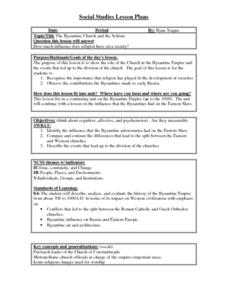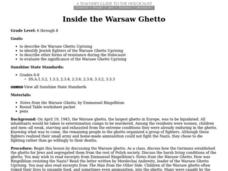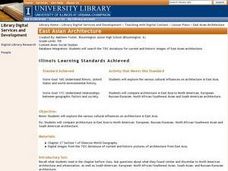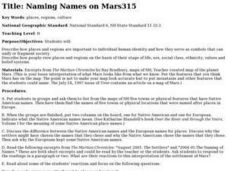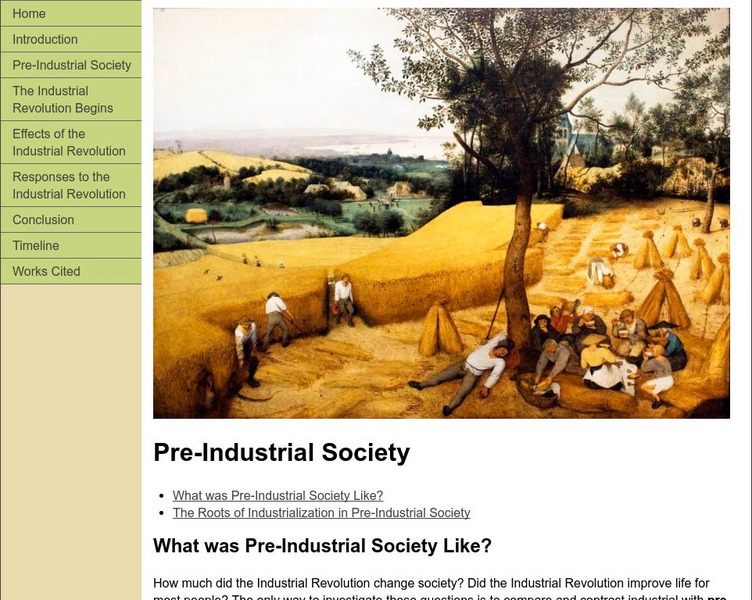Curated OER
Rice Around the World
Third graders draw pictures to show the life of early colonists and how they set the standard for rice farming. In this rice farming lesson plan, 3rd graders read about how and when Americans set the standards for growing and producing...
Curated OER
Tracing Migration Patterns
Seventh graders analyze migration patterns. In this migration lesson, 7th graders use U.S. Census records to trace the migration patterns of 2 German families in Kansas.
Curated OER
Thinking About Diversity: One Student's View
Students are asked how would you describe your yourself (Racial/Ethnic). Students read Little Boxes, where it is discussed that the author describes that backgrounds of her parents. They continue to read where they still need to come...
Curated OER
The Byzantine Church and the Schism
Students examine the role of the church in the Byzantine Empire, and the importance that relgion has played in the development of socieites. They research the events that led up to the division of the Byzantine church, and the...
Curated OER
Medieval Ethiopia, Mali and Nigeria: The Influence of Culture in Africa
Learners are introduced to the concept of cultural diffusion. In groups, they identify the culture of Mali, Nigeria and Ethiopia and work together to research how cultural diffusion has changed the country. To end the lesson, they...
Curated OER
Mapping Population Changes In The United States
Students create a choropleth map to illustrate the population growth rate of the United States. They explore how to construct a choropleth map, and discuss the impact of population changes for the future.
Curated OER
Number the Stars The Swastika
In this Language Arts worksheet, students read a quote from Number the Stars about a swastika. Students also read a history of how the swastika was once a symbol of peace.
Curated OER
Inside the Warsaw Ghetto
Eighth graders examine the conditions of the ghettos during the Holocaust. In this World History lesson, 8th graders analyze the impact of the Jewish fighters during he Warsaw Ghetto Uprising. Students participate in a round...
Curated OER
Selections on Islamic Fundamentalism
For this Islamic fundamentalism worksheet, students read a 3-page selection on the topic and then respond to 2 short answer questions based on the selection.
Curated OER
Feudalism: A Social and Political System
In this Feudalsim learning exercise, students read a 1-page selection about the topic, examine the listed Web sites about the topic, and then respond to 14 short answer questions about the information presented.
Curated OER
Litter and recycling
Students read and discuss as a group the story, " Litter bugs Ignoring new laws." They discuss the story and then fill out a questionnaire and discuss ways of improvement and recycling ideas.
Curated OER
Inside the Warsaw Ghetto
Middle schoolers describe the Warsaw Ghetto Uprising and identify Jewish fighters of the Warsaw Ghetto Uprising. They describe other forms of resistance during the Holocaust. They evaluate the significance of the Warsaw Ghetto Uprising.
Curated OER
East Asian Architecture
Seventh graders compare architecture in East Asia to North American, European, Russian/Eurasian, North African/Southwest Asian and South American architecture. They search the internet for current and historic images of East Asian...
Curated OER
North African and Southwest Asian Architecture
Seventh graders search online for current and historic images of North African and Southwest Asian architecture. They compare North African and Southwest Asian architecture to North American, European, Russian/Eurasian, and South...
Curated OER
Russian and Eurasian Architecture
Seventh graders search online for current and historic images of Russian and Eurasian architecture. They compare current Russian and Eurasian architecture to North American, European, and South American architecture.
Curated OER
European Architecture
Seventh graders search online for current and historic images of European architecture. They compare current European architecture to North American, and South American architecture.
Curated OER
Southeast Asian Architecture
Seventh graders search online for current and historic images of Southeast Asian architecture. They compare architecture in Southeast Asia to North American, European, Russian/Eurasian, North African/Southwest Asian and South American...
Curated OER
Land of the Rising Sun
Students survey aspects of traditional and modern Japanese customs and beliefs in the seven lessons of this unit. Both the culture and the geography of the country are studied in this unit.
Curated OER
Naming Names on Mars
Middle schoolers examine maps of New Hampshire to determine town and physical features that have Native American and European names. They discuss the reasons for these names to determine what influences the naming of places. They name...
Curated OER
The Berlin Wall
Middle schoolers enter the classroom and observe a wall that is set up with desks, bookshelves, or anything else available. to create a barrier that they cannot cross during the class. The class then is divided into East and West Berlin...
Curated OER
Religion
In this religion discussion worksheet, pupils answer questions about different aspects of religion.
Other
Modern World History: Pre Industrial Society
In this textbook unit, students learn about what society and the standard of living were like prior to the Industrial Revolution. The average peasant grew their food and kept farm animals. Change took place much more slowly, but the rate...
Oxfam
Ofxam: Welcome to Spain (Guidebook and Virtual Tour)
Developed in 2000-2001 to explore and celebrate the lives of people living in eight countries that lie along the prime meridian, this "welcome to Spain" guidebook and tour includes sections on Spain's history, geography, environment,...
Hofstra University
Hofstra Univ: Why Was Bubonic Plague So Devastating to European Society? [Pdf]
The Bubonic Plague or "Black Death" came out of the eastern Mediterranean along shipping routes, reaching Italy in the spring of 1348. By the time the epidemic was abating in 1351, between 25% and 50% of Europe's population had died. The...





